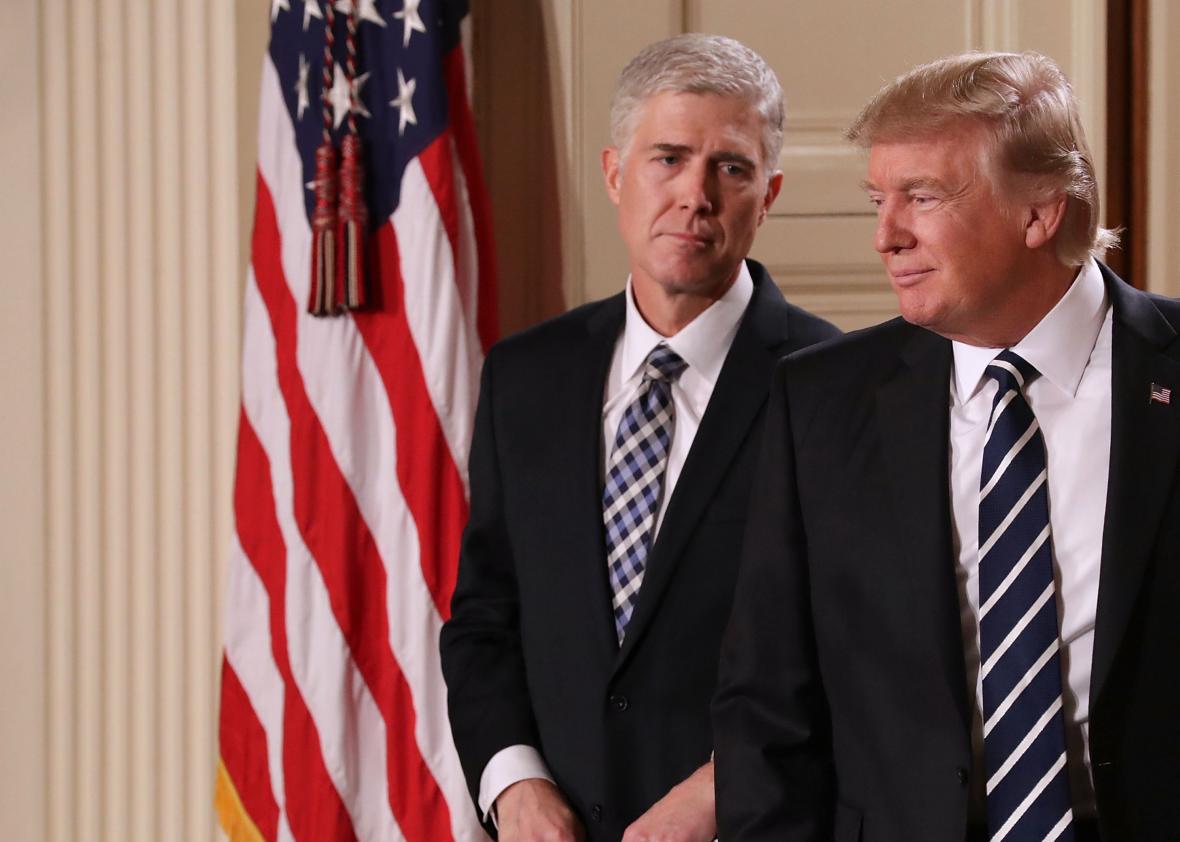Donald Trump got himself elected in part by acting not just tough on crime but merciless. The guy loves the police and hates anyone who’s even been accused of breaking the law—thinks they’re disgusting and dangerous and don’t deserve an inch of sympathy no matter the circumstances of their offense. This is what it means to be strong in Donald Trump’s mind—a reflection, it has been persuasively argued by historian Rick Perlstein, of the formative years he spent fearing for his life in New York during the bad old 1970s and ’80s.
So it comes as something of a surprise that his pick for the Supreme Court, Neil Gorsuch, has a judicial track record dotted with flashes of humanity when it comes to issues of criminal justice. There’s the time he dissented from his colleagues about whether it was right for a school police officer to handcuff and arrest a seventh-grader for burping in class. (“My colleagues suggest the law permits exactly this option and they offer ninety-four pages explaining why they think that’s so. Respectfully, I remain unpersuaded.”)
There’s the time he argued it was unfair to hold a guy responsible for failing to follow a law he didn’t know he was breaking, a dissenting opinion that began:
People sit in prison because our circuit’s case law allows the government to put them there without proving a statutorily specified element of the charged crime. Today, this court votes narrowly, 6 to 4, against revisiting this state of affairs. So Mr. Games-Perez will remain behind bars, without the opportunity to present to a jury his argument that he committed no crime at all under the law of the land.
Maybe my expectations have sunk too low since Inauguration Day, but even just the premise of those sentences—that putting someone in prison is undesirable and that putting someone in prison who doesn’t deserve to be there is more likely unfair than fine—feels somewhat reassuring.
Also reassuring: a speech Gorsuch gave in 2006 that was being highlighted Tuesday night by the folks at Right on Crime, an organization of conservatives who support criminal justice reform. In that speech, Gorsuch mostly applied his soon-to-be-famous verve to the conservative parlor game of mocking silly federal statutes (“Businessmen who import lobster tails in plastic bags rather than cardboard boxes can be brought up on charges. Mattress sellers who remove that little tag? Yes, they’re probably federal criminals too”). But he also said something that betrays an awareness of just how dangerous it is for prosecutors—federal and otherwise—to enjoy so much discretion that they can pretty much punish anyone they want: “What happens to individual freedom and equality,” Gorsuch asked, “when the criminal law comes to cover so many facets of daily life that prosecutors can almost choose their targets with impunity?”
Trump would probably say that prosecutors prosecuting willy-nilly sounds pretty good. But lest you think Mr. American Carnage has chosen a nominee who is some kind of soft-hearted criminal-coddler, consider the Gorsuch decisions flagged Tuesday by Igor Volsky from the Center for American Progress.* One of them has Gorsuch declining to provide relief to a defendant who got life in prison without parole because his lawyer threatened to quit his case if he took a plea bargain instead of going to trial. Several others suggest a tendency to side with police officers who have been accused of excessive force—including one who killed a man by shocking him with a Taser to the head during a chase and another who put a 9-year-old who’d stolen an iPad from his school in a “twist-lock.”
At a time when the nation is urgently reckoning with the problem of police violence and misconduct—and a time when the president and his likely attorney general are on the record as being proudly hostile toward critics of police—one would like to see a Supreme Court judge who is at least capable of seeing fault in the behavior of law enforcement officers. Gorsuch, it seems, does have an open mind on that point, not just because he takes seriously Fourth Amendment protections against unlawful search and seizure but because even the decisions in which he has ruled in favor of the police are argued with humility, instead of being informed by the Trumpish dogma that law enforcement officers are never wrong.
On criminal justice issues, at least, it could have been worse. Let’s just hope Trump doesn’t find out between now and the confirmation.
*Correction, Jan. 31, 2017: This post originally misspelled Igor Volsky’s last name.
Read more in Slate about Supreme Court nominee Neil Gorsuch.
